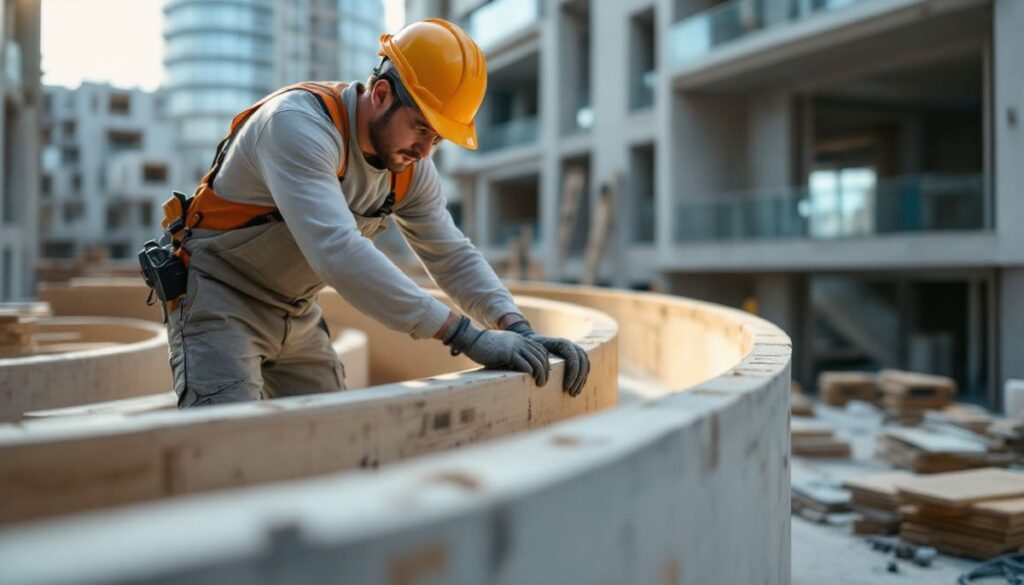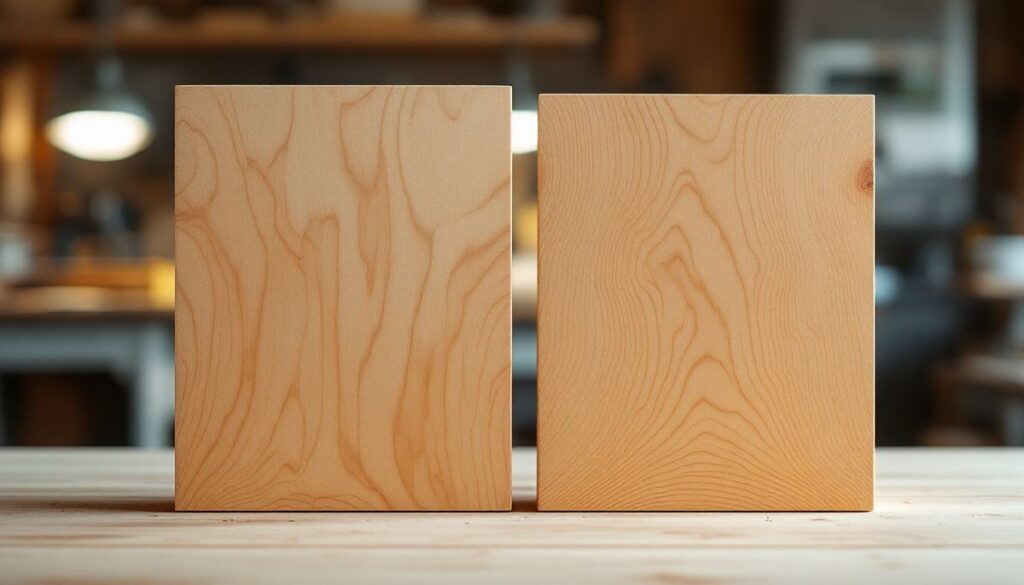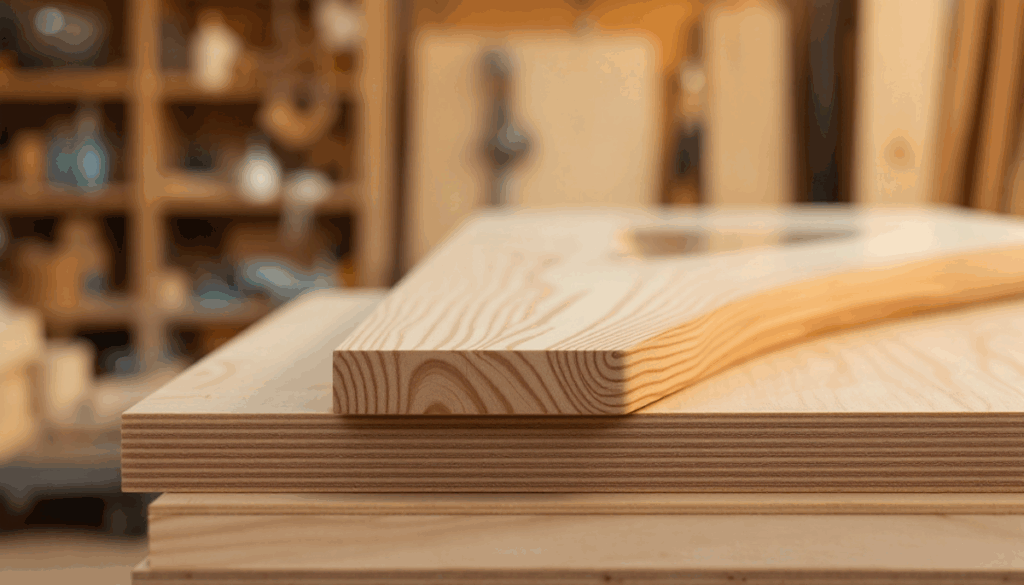What Is Formply and Concrete Plywood?
Formply is a specialised type of film-faced plywood designed specifically for use in concrete construction. It has a strong phenolic coating on both sides, which creates a smooth, non-porous surface that prevents concrete from sticking to the plywood during the curing process.
The phenolic film coating sets formply apart from regular plywood by making it highly resistant to moisture, chemicals, and wear. This coating provides the smooth concrete finishes that modern construction projects require while also maintaining its strength under the heavy pressures created when pouring concrete.
Structural vs Non-Structural Classifications
Australian formply products fall into two main categories:
- Structural concrete plywood: Certified to AS/NZS 2269 standards, designed to bear significant loads and pressures during concrete forming
- Non-structural concrete plywood: Suitable for applications where load-bearing capacity isn’t critical, such as decorative panels or lightweight formwork
Key Benefits for Australian Construction
The phenolic film plywood offers several advantages that make it indispensable for concrete work:
- Waterproofing capabilities that prevent moisture penetration and warping
- Exceptional reusability – quality formply can withstand multiple concrete pours when properly maintained
- Superior concrete finishes with minimal surface imperfections
- Chemical resistance against concrete additives and curing compounds
You’ll discover that investing in quality formply significantly reduces material costs per project through its extended service life and consistent performance across multiple applications.
What Are the Common Grades of Formply Available in Australia?
Australian construction projects rely on two primary structural plywood grades that meet rigorous engineering standards.
1. F14 Plywood
F14 plywood represents the standard grade with a characteristic bending strength of 14 MPa, making it suitable for:
- Residential concrete pours
- Small commercial slabs
- General formwork applications where moderate loads are expected
2. F17 Plywood
F17 plywood delivers superior performance with a characteristic bending strength of 17 MPa, positioning it as the preferred choice for:
- High-rise construction
- Heavy industrial projects
- Applications requiring maximum structural integrity
This grade handles significantly higher concrete pressures and spans longer distances between supports without deflection.
Both grades must comply with AS/NZS 2269 certification standards, which guarantee structural reliability and consistent performance across Australian construction sites. You’ll find certification stamps clearly marked on genuine structural formply, providing assurance that the product meets national building codes.
Grade Selection Guidelines:
- F14 plywood: Single-storey homes, small retaining walls, residential driveways
- F17 plywood: Multi-storey buildings, large commercial pours, infrastructure projects
The thickness variations within each grade further influence load capacity, with 17mm and 21mm options commonly available. Your project’s concrete pressure, span requirements, and safety factors determine which grade delivers optimal performance while maintaining cost efficiency. Structural engineers typically specify the minimum grade requirements based on calculated loads and safety margins.
Where Can They Buy Formply and Concrete Plywood in Australia?
Finding reliable formply suppliers Australia has become easier with multiple purchasing channels available across the country. You can source quality concrete plywood through several distinct supply networks, each offering different advantages for your construction projects.
Major Hardware Retailers
Bunnings Warehouse stands as Australia’s largest hardware retailer, stocking F14 and F17 formply across most locations. You’ll find standard sheet sizes readily available, though specialty thicknesses may require ordering. Mitre 10 stores also carry formply products, particularly in regions where they maintain strong market presence.
Specialist Timber Merchants
Timber merchants Australia provide the most comprehensive formply selection. These suppliers typically stock:
- Multiple grade options (F14, F17, and specialty grades)
- Various thickness ranges from 12mm to 25mm
- Custom cutting services for specific project requirements
- Technical support for grade selection
Specialist merchants often maintain relationships with manufacturers, ensuring consistent quality and competitive pricing for bulk orders.
Online Formply Retailers
Digital platforms have revolutionised formply purchasing, with hardware stores formply sections expanding online. Dedicated construction material websites offer:
- Detailed product specifications and certification information
- Bulk ordering capabilities with delivery scheduling
- Price comparison tools across different suppliers
- Customer reviews and project case studies
Online retailers frequently provide better pricing for large quantities, making them attractive for commercial construction projects requiring substantial formply volumes. Visit https://worksafe.nt.gov.au/forms-and-resources/safety-alerts/non-compliant-plywood-sold-for-formwork-use to get more about non-compliant plywood.
How to Ensure Quality When Purchasing Formply?
F grade certification stamps serve as your primary indicator of structural integrity when buying formply. You need to verify these stamps are clearly visible and match Australian standards AS/NZS 2269 for structural applications. The certification ensures the plywood meets specific load-bearing requirements essential for concrete formwork projects.
Physical Inspection Checklist
Before purchasing any formply sheets, conduct a thorough visual inspection:
- Surface integrity – Check for delamination, warping, or phenolic film damage
- Edge condition – Look for splits, chips, or moisture penetration along edges
- Thickness consistency – Measure multiple points to ensure uniform dimensions
- Corner damage – Examine corners for impact damage that could compromise structural performance
Supplier Reputation Matters
Quality formply buying tips always emphasise choosing established suppliers with proven track records. Reputable timber merchants typically offer:
- Quality guarantees on their formply products
- Proper storage conditions that prevent moisture damage
- Knowledgeable staff who can guide F grade selection
- Batch consistency across multiple sheet purchases
When purchasing from discount suppliers or clearance sales, damaged plywood inspection becomes crucial. Minor surface scratches won’t affect performance, but deep gouges, edge splits, or film separation can lead to concrete blowouts and costly project delays.
To mitigate these risks, it is advisable to follow guidelines similar to those outlined in the Marlborough Towne Specifications and Project Manual. These documents often provide valuable insights into the quality standards expected in construction materials.
Where to Buy Formply and Concrete Plywood in Australia depends heavily on balancing cost with quality assurance – established suppliers may charge premium prices but deliver consistent, certified products that meet Australian construction standards.

What Are the Price Considerations When Buying Formply in Australia?
Formply pricing in Australia can vary quite a bit depending on several important factors that directly affect your project budget. Here are the main things to keep in mind:
1. Grade Selection
The grade you choose is a major factor in determining costs. F17 formwork plywood is more expensive than F14 alternatives, but it offers better strength and load-bearing capabilities. This makes it a worthwhile investment for multi-storey construction projects that require maximum durability.
2. Thickness Variations
The thickness of the sheets also impacts pricing. Standard 17mm sheets usually have the most competitive price per square metre, while thicker 21mm options can cost 20-30% more.
3. Sheet Dimensions
The size of the sheets can also affect pricing. Larger formats like 2400x1200mm tend to provide better value compared to smaller cuts.
4. Building Material Costs
Building material costs in Australia have been quite unstable recently due to supply chain disruptions and increased demand in the construction industry. Formply prices have gone up by about 15-25% since 2022, which is part of a larger trend affecting timber products across the country.
5. Regional Pricing Variations
Different Australian states have different pricing structures for Formply. Generally, metropolitan areas have more competitive rates because there are more suppliers in those locations. On the other hand, remote areas may have higher delivery costs that can add $50-100 per cubic metre to the overall price.
6. Bulk Purchasing Arrangements
If you’re planning to buy a large quantity of Formply, it’s worth looking into bulk purchasing arrangements. You may be able to negotiate discounts ranging from 5-15% for orders exceeding 100 sheets.
When considering larger purchases, make sure to take into account your storage requirements and project timelines as well. This will help you maximise cost efficiency and ensure that you have enough materials on hand when you need them.
Can They Buy Specialized Types Like LVL Formwork or HDO Plywood Locally?
LVL formwork Australia buying options are becoming increasingly accessible through specialist timber merchants and construction supply companies. Laminated veneer lumber (LVL) formwork delivers superior strength-to-weight ratios compared to traditional plywood, making it ideal for high-load applications and complex architectural projects. You’ll find LVL formwork available through:
- Specialist engineered timber suppliers – Companies like Tilling Timber and Carter Holt Harvey stock various LVL formwork sizes
- Major construction supply chains – Some larger Bunnings warehouses now carry LVL products on special order
- Direct manufacturer sales – Contacting LVL manufacturers directly often provides better pricing for bulk orders
HDO plywood suppliers Australia offer High-Density Overlay products that create exceptionally smooth concrete finishes. HDO plywood features a resin-impregnated fibre overlay that resists moisture penetration and provides multiple reuses. Key suppliers include:
- Premium timber merchants – Established suppliers like Britton Timbers stock HDO plywood for architectural concrete work
- Specialised formwork retailers – Companies focusing exclusively on concrete formwork products maintain HDO inventory
- Import specialists – Some suppliers import HDO plywood directly from North American manufacturers
You can expect HDO plywood to cost 20-30% more than standard formply, but the superior concrete finish quality and extended reusability often justify the investment for architectural applications requiring premium surface finishes.
What Additional Products Should Buyers Consider Alongside Formply?
Successful concrete construction requires more than quality formwork plywood. Reo bars Australia suppliers offer essential reinforcement materials that work hand-in-hand with your formply investment. These steel reinforcement bars provide the structural backbone for concrete pours, creating the composite strength that modern construction demands.
Rust-resistant reo bars become particularly crucial for coastal projects across Australia’s extensive shoreline. Standard mild steel reinforcement can deteriorate rapidly in salt-laden environments, compromising structural integrity within years rather than decades. Galvanised and epoxy-coated options available through specialist suppliers extend infrastructure lifespan significantly, making them essential for beachfront developments, marine structures, and buildings within 5 kilometres of the coast.
Chain shade mesh suppliers Australia provide complementary site protection products that many timber merchants stock alongside formwork materials. These mesh systems serve dual purposes during concrete construction:
- 50% shade mesh allows airflow while protecting fresh concrete from direct sunlight and wind
- 90% coverage options create enclosed work areas for weather-sensitive pours
- UV-resistant variants maintain performance across multiple projects
Many suppliers bundle these products with formply orders, recognising that professional contractors require comprehensive solutions. You’ll find chain and shade mesh particularly valuable for large-scale projects where concrete curing conditions directly impact final strength and finish quality. The mesh also provides essential worker protection during extended concrete operations.
How Can Buyers Benefit from Supplier Services Like Covert Procurement?
Procurement specialists like Covert Procurement are changing the way construction companies in Australia find and buy formply and concrete plywood. These services use industry knowledge and connections with suppliers to get better quality materials at competitive prices, solving the problem of keeping standards high while dealing with rising construction costs.
More Than Just Buying
Covert Procurement’s role in construction materials goes beyond just buying things. Their experts look at what your project needs, figure out the best types of plywood for formwork, and talk directly to manufacturers and distributors to get the best deals. This method cuts out middlemen who usually add 15-25% to the cost of materials.
Saving Money on Plywood
The cost reduction formwork plywood benefits become clear through smart buying in large quantities and building long-term relationships with suppliers. Procurement specialists can get F17 grade formply at prices usually meant for F14 grade purchases, which is especially helpful for big projects that need top-quality materials.
Ensuring Quality
Another big advantage is making sure the quality is up to standard. These services check certification stamps, look at materials before they are delivered, and keep good relationships with suppliers who always meet Australian standards. This means you get materials that are guaranteed to comply with AS/NZS 2269 without having to spend time checking each supplier yourself.
Coordinating Deliveries
Procurement specialists also help plan delivery times to fit your construction schedule. This helps reduce the need for storing materials on-site and minimises the risk of weather damage to them. Thanks to their connections in the industry, they may also be able to get special products like HDO plywood or LVL formwork that smaller suppliers have trouble getting consistently.

What Maintenance Tips Should Users Know After Purchasing Formply?
Proper formwork plywood maintenance tips Australia construction teams follow can dramatically extend your formply’s service life and maximise your investment return. You need to implement specific handling and care practices from the moment your formwork plywood arrives on site.
Essential On-Site Handling Practices
Damage prevention during concrete pouring requires careful attention to several key areas:
- Store formply sheets flat on level timber bearers, never directly on the ground
- Apply release agents evenly across the phenolic surface before each use
- Remove concrete splatter immediately after stripping to prevent permanent bonding
- Handle sheets with proper lifting equipment to avoid edge damage and warping
Extending Formply Durability Through Regular Maintenance
You can significantly increase reusability by following these proven maintenance practices:
- Clean the phenolic film surface with appropriate solvents after each concrete pour
- Inspect for delamination or edge damage before storage
- Repair minor surface scratches with compatible sealers to maintain waterproofing
- Rotate stock regularly to ensure even wear across your formwork inventory
Edge sealing becomes critical for Australian conditions where moisture exposure is constant. You should seal cut edges with appropriate primers to prevent water penetration and subsequent delamination.
Temperature considerations matter significantly – store your formply in shaded areas during hot Australian summers to prevent warping. These maintenance practices help construction teams achieve 20-30 uses per sheet, making formwork plywood a cost-effective choice for repeated concrete applications.
Related : Plywood Formwork: Durable Solutions for Stronger Concrete Structures

